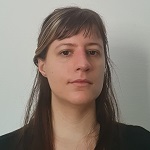by Beatriz Kalichman, Researcher, University of São Paulo, Brazil and Centre for Academic Primary Care, University of Bristol, UK
Beatriz Kalichman, an early career researcher (ECR) on the Healthcare Responding to Violence and Abuse (HERA) international research project at the University of São Paulo and, honorarily, at the Centre for Academic Primary Care, University of Bristol, reflects on the National Institute for Health Research (NIIHR)-funded writing workshop, ‘Writing for Global Health: developing academics of the future’, in Summer 2021. The workshop was co-developed by ECRs and delivered by the University of Bristol’s Centre for Academic Language and Development.
Academic English writing is very important for career progression and was identified as an issue that ECRs on the HERA project who don’t have English as a first language wanted to work on. HERA, funded by the Medical Research Council Global Challenges Research Fund and NIHR Global Health Research Group Award, aims to understand how healthcare systems in low and middle income countries (LMICs) can integrate and evaluate interventions for violence against women that link with community organisations and, ultimately, ensure better outcomes for women and children.
Capacity strengthening has been an important component of the HERA work, with a special focus on the ECRs in the group. In 2019 the group identified the need for more involvement from partners from LMICs with the capacity strengthening aspect of the programme in order to make sure more perspectives were included. In 2020 there was a call for someone from LMICs to join the capacity strengthening team to which two ECRs responded. Giselle Dass (Sri Lanka) and I (Brazil) have since been part of the capacity strengthening team and had the opportunity to contribute to different projects, the latest of which was the organising of an NIHR funded writing workshop.
It would be impossible to write about organising a workshop in 2021 without talking about the impacts of COVID-19 and the ways it forced us to adapt. Moving the workshop online was frustrating since it meant we wouldn’t be able to get together as a group, something we were really looking forward to. We also had to give up some of the extra activities that took advantage of the fact that we would all be in the same city, like visits to healthcare services and meetings with senior members of the UK staff to present our work and get feedback on it.
Although abandoning those plans was disappointing, the online format also had its benefits. For example, it allowed more people to attend the workshop, since it not only eliminated the need to travel but also to take a whole week away from other commitments, since the content of the workshop was distributed between different sessions over four weeks. This way of organising the workshop also allowed us to have more time to reflect on what we learnt in each session and develop our skills according to the themes of each week, which we did through assignments and group discussions.
Of all the advantages the adaptation allowed, the biggest one was probably that it freed up part of the budget so we were able to hire extra tutoring sessions to be delivered for interested attendees after the workshop ended. The spacing of the workshop over four weeks had already allowed us to have a more continuous learning experience, and the extra sessions accentuated this aspect, helping to cement the knowledge acquired.
As an ECR, organizing an international workshop was an enriching experience and being able to do this with the support of more senior members of the team gave me enough space to learn while providing the necessary support. This workshop in particular was very special since we applied to a few different funding calls until we were able to get the financial support for it, so we were all very keen to make the most of it.
Making sure ECRs from LMICs are able to communicate findings to a broader audience is a vital way of ensuring our research generates more impact and our careers advance. Being able to offer the workshop to the team was a priority and we were very happy to make it happen, despite the challenges created by the pandemic.
To end the workshop, the HERA team interviewed three editors of global health, gender-based violence, and methodology journals about academic publishing. Watch the videos now, here.

